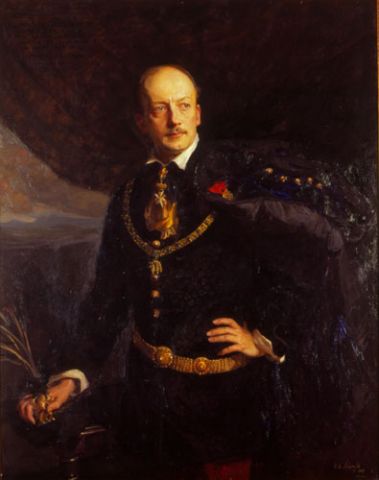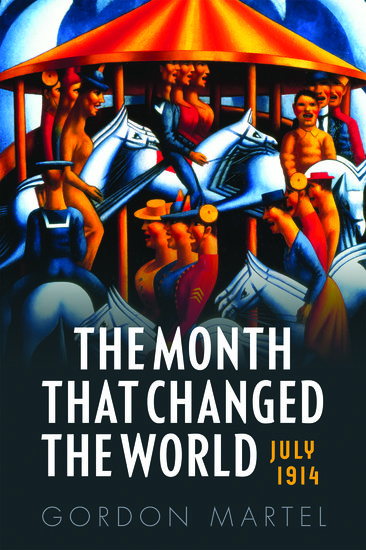July 1914 was the month that changed the world. On 28 June 1914, Archduke Franz Ferdinand was assassinated, and just five weeks later the Great Powers of Europe were at war. But how did it all happen? Historian Gordon Martel, author of The Month That Changed The World: July 1914, is blogging regularly for us over the next few weeks, giving us a week-by-week and day-by-day account of the events that led up to the First World War.
By Gordon Martel
Although it was Sunday, news of the assassination rocketed around the capitals of Europe. By evening Princip and Čabrinović had been arrested, charged, taken to the military prison and put in chains. All of Čabrinović’s family had been rounded up and arrested, along with those they employed in the family café; Ilić was arrested that afternoon. The remaining conspirators fled the city but within days six of the seven had been captured.
On Sunday evening crowds of young Croatian and Muslim men gathered and marched through Sarajevo, singing the Bosnian anthem and shouting ‘Down with the Serbs’. About one hundred of them stoned the Hotel Europa, owned by a prominent Serb and frequented by Serbian intellectuals. The next morning Croat and Muslim leaders held a rally to demonstrate their support for Austrian rule. They sang the national anthem of the monarchy and carried portraits of the emperor. Sporadic demonstrations quickly escalated into full-scale rioting. Crowds began smashing windows of Serbian businesses and institutions, ransacking the Serbian school, stoning the residence of the head of the Serbian Orthodox Church in Sarajevo and besieging the homes of prominent Serbs.
The people of Vienna had remained calm when news of the assassination arrived on Sunday, but by Monday afternoon a crowd gathered at the Serbian legation and police had to be called in. Behind the scenes the chief of Austria-Hungary’s general staff argued that they must ‘draw the sword’ against Serbia. Leading Viennese newspapers however argued against a campaign of revenge. The emperor returned to Vienna from his hunting lodge on Monday, blaming himself for the killings: God was punishing him for permitting Franz Ferdinand’s marriage to Sophie.
By Tuesday the Austro-Hungarian foreign minister, Count Berchtold, was convinced that the conspiracy had been planned in Belgrade. But what would he propose to do? Would he agree to ‘draw the sword’ against Serbia? Or might he be satisfied with Serbian promises to act against those involved in the conspiracy? His choice would rest largely upon the advice he received from his German allies: he could not risk war without German support.

On Wednesday Serbia’s prime minister instructed his representatives to explain that his government had taken steps to suppress anarchic elements within Serbia, and that it would now redouble its vigilance and take the severest measures against them: ‘Serbia will do everything in her power and use all the means at her disposal in order to restrain the feelings of ill-balanced people within her frontiers.’
Might this satisfy the Austrians? Ambassador Tschirschky could not envision them demanding more than that Serbia should cooperate in an investigation into the assassination. At the same time, the Hungarian minister-president, István Tisza, was urging the emperor not to use the assassination as an excuse for a ‘reckoning’ with Serbia: it could be fatal to proceed without proof that the Serbian government had been complicit in the plot.
Few expected Count Berchtold to act decisively. He was widely regarded as intelligent but weak, charming but cautious. No one expected him to undertake anything adventurous, and he now appeared to fulfil these expectations. Before making any crucial decisions Berchtold revised an existing memorandum that advised how to meet the growing threat of Russia in the Balkans and turned it into a plea for German support in Austria’s coercion of Serbia. He then drafted a ‘personal’ letter to be sent from the emperor to the kaiser. On Thursday Franz Joseph wrote the letter in his own hand: the crime committed against his nephew (no mention of the duchess) had resulted directly from the agitation conducted by ‘Russian and Serbian Panslavists’ who were determined to weaken the Triple Alliance and ‘shatter my empire’. The Serbian government aimed to unite all south-Slavs under the Serbian flag, which was a lasting danger ‘to my house and to my countries’.
By Thursday a preliminary police investigation had identified seven principal conspirators. Six of them had been taken into custody. Interrogations of the prisoners already indicated that they could be linked to highly-placed officials in Belgrade. And the Austrian military attaché in Belgrade was sending reports linking the conspiracy to Serbian army officers and to the Narodna Odbrana. The pieces of the puzzle seemed to be fitting into place. That evening the bodies of the archduke and the duchess arrived in Vienna; they were to lie in state at the Hofburg Palace until a requiem mass was said on Saturday. They would then be transported to their final resting-place in the chapel Franz Ferdinand had built for that purpose at his castle in Artstetten.
The politicians and diplomats of the so-called Triple Entente – France, Russia, and Britain – expressed few fears of an impending international crisis in the week following the assassination. When the French cabinet met following the assassination on Tuesday the situation arising from Sarajevo was barely mentioned. The French ambassador in Vienna believed the emperor would restrain those seeking revenge and that Austria was not likely to go beyond making threats. The Russian ambassador agreed: he did not believe that the Austrian government would allow itself to be rushed into a war for which it was not prepared. In London, the permanent under-secretary of state at the Foreign Office doubted that Austria would undertake any ‘serious’ action.
While Entente diplomats were comforting themselves with the thought that Austria would not go beyond words, Berchtold despatched his chef de cabinet, Count Hoyos, to Berlin. He carried with him the emperor’s letter to the kaiser and the long memorandum on the Balkan situation that the foreign minister had revised for the purpose. Hoyos, one of the ‘young rebels’ at the Ballhausplatz (the Austrian foreign office), advocated an aggressive foreign policy as an antidote to the monarchy’s apparent decline. Before leaving for Berlin he told a German journalist that he believed Austria must seize the opportunity to ‘solve’ the Serbian problem. It would be most valuable if Germany promised to ‘cover our rear’.
In Berlin on Sunday 5 July 1914 the Germans seemed prepared to do just that. Although the Kaiser expressed his concern that severe measures against Serbia might lead to serious complications he promised that Austria could rely upon the full support of Germany. He did not believe that the Russians were prepared for war, but even if it came to this he assured the Austrian ambassador that Germany would ‘stand at our side’ and that it would be regrettable if Austria failed to seize the moment ‘which is so favourable to us.’ This would go down in legend as the ‘blank cheque’.
Gordon Martel is a leading authority on war, empire, and diplomacy in the modern age. His numerous publications include studies of the origins of the first and second world wars, modern imperialism, and the nature of diplomacy. A founding editor of The International History Review, he has taught at a number of Canadian universities, and has been a visiting professor or fellow in England, Ireland and Australia. Editor-in-chief of the five-volume Encyclopedia of War, he is also joint editor of the longstanding Seminar Studies in History series. His new book is The Month That Changed The World: July 1914.
Subscribe to the OUPblog via email or RSS.
Subscribe to only history articles on the OUPblog via email or RSS.
Image credit: Count Leopold Berchtold. By Philip de László. Public domain via Wikimedia Commons


Recent Comments
There are currently no comments.